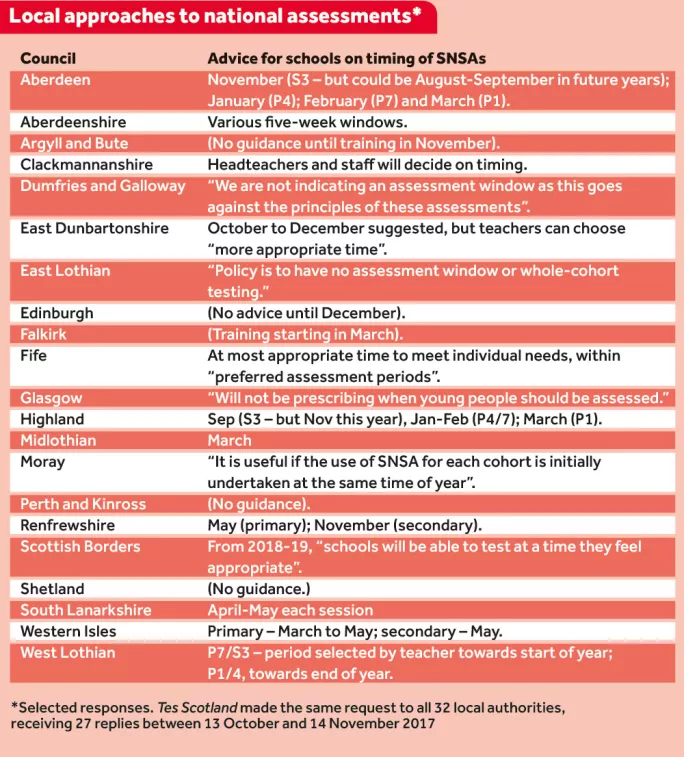National assessments ‘can’t give a valid picture’

An investigation has raised doubts over whether flagship standardised assessments will provide the national overview of educational progress promised by the government.
It reveals that councils’ guidance for schools and teachers on the assessments varies markedly around the country, with some insisting they are set at specific times of year while others leave timings entirely up to schools.
One academic said such varied approaches shows that Scottish National Standardised Assessments (SNSAs) are “a waste of time”. The government, however, downplayed the importance of SNSAs as a national measure of progress, saying that they are part of a much broader mix of information.
Tes Scotland used Freedom of Information legislation to ask Scotland’s 32 local authorities for any advice or guidance about SNSAs that was given in 2017 to schools, teachers and headteachers, as they prepare for the assessments of P1, P4, P7 and S3 pupils.
The replies, from 27 councils, revealed sometimes starkly contrasting approaches.
Moray, for example, will - at least initially - require year groups to take the assessments at the same time of year annually, in order to “gain an accurate picture of the ‘added value’ of progress” in pupils’ reading, writing and numeracy” and to “reduce unnecessary and prolonged workload and bureaucracy”.
Dumfries and Galloway, however, stated that “we are not indicating an assessment window as this goes against the principles of these assessments”. Glasgow, similarly, will “not be prescribing when young people should be assessed” and “would not anticipate full cohorts of young people being assessed simultaneously”, explaining that timings should be decided by schools and class teachers.
Other responses were less clear-cut - certain times of year were recommended for the tests but teachers had some freedom - while some councils had not yet given any guidance to schools and others will not begin training teachers on SNSAs until well into 2018.
When first announcing the SNSAs in August 2015, first minister Nicola Sturgeon said that many councils used different systems of standardised assessment, making it “much more difficult to get a clear and consistent picture of progress”, an issue the new assessments were supposed to help resolve.
‘A waste of time’
But Lindsay Paterson, professor of education policy at the University of Edinburgh, said that the varied local approaches to SNSAs “cannot give a valid national picture” and that, therefore, “the whole exercise is a waste of time”.
Conservative education spokeswoman Liz Smith said the “wide variation” in approaches shows “very clearly that there is no clarity over the meaning of standardised assessment”.
Liberal Democrat education spokesman Tavish Scott said that the government “needs to ensure the tests are done at the same time” otherwise they “will not deliver on what the government claimed as their main policy objective - national data to monitor the performance of schools”.

However, there was a different view from the EIS teaching union, which in September was reassured by education secretary John Swinney’s promise that the government would not collect detailed information about individual pupils or schools, easing fears that SNSAs could lead to league tables. General secretary Larry Flanagan said: “Teachers are best-placed to know which type of assessments best suit the needs of the children in their classrooms and are best-equipped to decide when to use them. It is essential that there is no pressure placed on teachers to use the SNSAs at a certain point in time.”
Louise Hayward, University of Glasgow professor of educational assessment and innovation, told Tes Scotland that teachers should have freedom to decide the timing of SNSAs for individual children “if the tests are to serve their prime purpose, as a diagnostic tool to support teachers”.
She said: “If local authorities collect test data in ways that allow comparison of schools and teachers, there will be washback into classrooms.” An over-emphasis on test data in the old 5-14 curriculum, she added, led to “over-rehearsal for tests, whole-school testing in primary schools [and] repeated test taking”.
A government spokesman said: “Standardised assessments are only one source of information teachers have available to inform their professional judgement, alongside classwork, observation and other assessment options.
“As we have previously stated, standardised assessment results in isolation will only give a snapshot of how a child is doing - which is why we are focusing on CfE (Curriculum for Excellence) data, which will provide a much fuller and more meaningful picture of how Scotland’s education system is performing and where improvements are required.”
You need a Tes subscription to read this article
Subscribe now to read this article and get other subscriber-only content:
- Unlimited access to all Tes magazine content
- Exclusive subscriber-only stories
- Award-winning email newsletters
Already a subscriber? Log in
You need a subscription to read this article
Subscribe now to read this article and get other subscriber-only content, including:
- Unlimited access to all Tes magazine content
- Exclusive subscriber-only stories
- Award-winning email newsletters